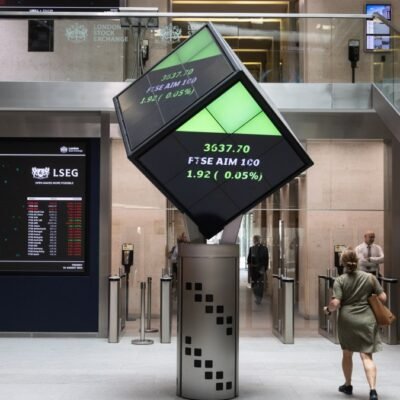Brokerage firm Charles Schwab Corp. issued a report last week on the UK online trading market, showing it increasingly mirrors the US. Gen-Z and Millennials are pursuing trader-like strategies substantially more than the buy-and-hold tactics favoured by either Gen-X or Boomers.
Younger investors are more open to investing using futures, and in fractional shares, the research shows, and are 50 per cent more active than their older counterparts, with nearly 60 per cent making adjustments monthly.
However, the UK is relatively less sophisticated, with fewer adopting the more complex derivatives trading seen widely in the US, particularly in same-day expiry options. One intriguing development is in “copy trading” – a style where followers mimic ‘leaders’ portfolios and track performance via a leaderboard. This is predominantly on the investment platform provider eToro Group Ltd. It’s attracted the interest of the UK’s Financial Conduct Authority.
Imagine if the first telephone you picked up was a 5G smartphone; you’d assume all handsets had similar capabilities. Similarly, if your first “investment” was a fractional stake in newly resurgent bitcoin or a soaring Magnificent Seven stock, your mindset is bound to be influenced.
And your ultra-low-cost 24/7 online platform provider also offers derivatives, leverage and a raft of trading techniques that don’t involve classic value analysis – it truly is a different world than 93-year-old Warren Buffett’s.
There’s a flipside to this youthful experimentation. Instead of applying value filters like generations of chartered financial analysts, there’s a much higher propensity to stick with whatever’s hot on social media.
Loading
But that doesn’t mean staying at home; youthful traders are comfortable trading US tech or meme stocks, regardless of currency or time zone, rather than sticking with storied domestic bellwethers.
Research consultancy Investment Trends highlights that new, younger investors have notably different needs since the pandemic. There’s been a near doubling in online account openings since 2020, many of which are still active, although the pace of expansion has tailed off.
Retail investing is a huge market, with more than $20 trillion invested and over 100 million accounts globally. But the biggest changes are happening in the online business, with more than 11 million US-based accounts trading online at least once a year.
The picture is mirrored in Europe, with the UK and Germany the most active online marketplaces. The top reason cited in Investment Trends research for opening an online account is the ability to speculate with small amounts of money.
Numbers two and four are more familiar: managing pension savings and finding higher returns than from cash savings. But reasons three and five are driven by Gen-T; the desire to learn new skills, and the availability of commission-free trading.
Roaring Kitty hasn’t had its last roar. The new age of investing was accelerated by the pandemic and social media and will likely be further propelled by artificial intelligence. Adapt or die might prove to be a good maxim for long-only fund managers and older generations of investors alike.
– Bloomberg.
- Advice given in this article is general in nature and not intended to influence readers’ decisions about investing or financial products. They should always seek their own professional advice that takes into account their own personal circumstances before making any financial decisions.





